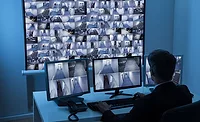Top Rewards of Small Business Surveillance
When it comes to surveillance, making an investment to protect the small business’s assets is a must, and it can help business owners reap unexpected rewards.
Small businesses face myriad challenges, not the least of which being the lack of capital and support that can come from a corporation-sized enterprise. However, when it comes to surveillance, making an investment to protect the small business’s assets is a must, and it can help business owners reap unexpected rewards.
Theft Prevention, Reduction and Prosecution
At Warrior Fuel gas station and convenience store in New Mexico, Silvia Gibson, manager of retail operations, and David Naquin, general manager for Southern Sandoval Investments, Ltd., designed a security system that would help mitigate the risk and investigate incidents of theft. For a store that takes in $70,000-$85,000 a day on gasoline and convenience store sales, it was imperative that the small enterprise have a smart surveillance program; they installed 36 cameras throughout the property, including over registers, on the sales floor, in the smoke room, beer cave, offices and under the gasoline canopy.
“Because we deal in so much cash, the goal is to be able to go back and see any potentially compromised situations and either report them to the authorities or train employees to handle them better,” says Naquin.
Compared to the original, analog-driven Warrior Fuel store, located across the street, the digital surveillance at Warrior Fuel 2 “helps us feel much more like we’re in control of things,” says Gibson. “It enables managers to better run the store, and we use it every day.”
One recent example, Naquin says, was when a driver left with the gasoline hose still attached to the car, Warrior Fuel’s managers were able to use the video to get the plate number and hand over that information to the police, who then tracked down the driver to get compensation for the damaged property.
Shrink continues to drop due to new video surveillance initiatives at Plato’s Closet in Des Moines. The resale clothing store, aimed at young college students and teenagers, faces heavy employee turnover, retail theft and fencing problems. However, according to Steve Olson, owner of the Des Moines Plato’s Closet, his shrink rate used to be a little more than one percent, but an investment in 19 IP cameras – which are lower to the ground and produce sharper images than other retail locations – has lowered his store’s shrinkage to a mere 0.8 percent of sales.
Because of its unique position as a resale store for a wide range of clothing – from shoes to expensive brands of jeans to costume jewelry – tag switching is a quick fraud method that employees must be trained to recognize. For example, Olson says, a customer might tear the tags off of a $50 pair of high-end Nike sneakers, replacing it with a $15 tag from a nearby pair of regular Nikes, and then attempt to pay for the shoes at a fraction of the actual cost, hoping that employees don’t notice. If the employee objects to the price, he or she can call over a manager to immediately review the surveillance footage.
Olson also has a secret weapon – an AXIS P-85 Series pinhole door camera installed in a pole by the side of the door, disguised in a height strip.
“A lot of times, when thieves enter buildings, they wear their ballcaps and keep their heads down to keep their facial recognition to a minimum, but there’s a problem when you’re trying to exit a building – you need to see what’s ahead of you,” says Patrick Bailey, of ICS Advanced Technologies and the project integrator. “Because the pinhole camera is at eye-level, and it’s right next to the doorway, as anyone is exiting, you get that recognition that you wouldn’t normally get from a very wary thief or criminal. It provides a stunningly clear 720p image looking in toward the cash register and anybody exiting.”
Those pictures can be provided to law enforcement, and then shared with the local Retail Theft Group – an organization of retail managers and police officers who share information about recent crime trends and serial shoplifters at large.
Enabling Investigations
Olson is also using his store’s surveillance system to nip any inappropriate behavior in the bud. For example, a customer in the changing room noticed that someone in the next stall was taking pictures of her on his cellphone under the divider. Video surveillance was able to capture the perpetrator’s face, and when he returned to the store, employees were ready, Olson says. When he entered a changing room, they taped an “out of order” sign on the adjacent cubicle and called the police, who inspected the man’s phone to find evidence of his misdeeds at other stores. While the arrest might not have an immediate effect on the business’s profits, the investigation alerts potential wrongdoers that Plato’s Closet is not the best location for them, while providing peace of mind for shoppers.
At Redamak’s Tavern in New Buffalo, Mich., an attempted break-in prompted an upgrade from nine cameras to nearly 30. The family-owned destination restaurant seats up to 400 people, and it has been in general manager Chuck Maroney’s family since 1975. However, as a small business, one lawsuit could pose a serious threat to the restaurant’s future. For example, Maroney says, there was a claim of a slip and fall in the restaurant: “the customer stood up from the booth and then suddenly disappeared from the camera view,” he says. After checking the video, it was clear that the fall was bogus, but it still cost the business $5,000 to resolve. However, Maroney says, that is much better than a $50,000 payout.
The incident spurred him to add more digital cameras to his surveillance program, factoring in criss-cross shots for better overall coverage. He also uses the system to record or catch people who “dine and dash.”
Surveillance at Redamak’s also covers walkways and the parking lot to get proof of any accidents on the property. While Michigan is primarily a no-fault state for accidents on the business’s private property, the video evidence helps to solve any disputes between drivers or injured parties over fault, Maroney says.
“We live in a litigious society, so we’re using our cameras to verify accidents,” says Rich Zaleski, the owner of Strathmore Bagels in Long Island, NY. “We use our cameras to address unusual or suspicious situations and correct any problems.” His system, which runs on an eight-camera DVR, helped the bagel shop and deli win a “moral victory,” he says. During November and December, employees give up their tips for donations during a Holiday Fun Drive. Someone dipped into the charity jar, however, stealing a fistful of donated tips. By using the surveillance system, Zaleski was able to contact the thief’s parents, and the money was returned.
An installation of 56 new cameras at Miller Transportation Inc.’s new $5-million facility in Louisville provides visual evidence of everyday threats, such as vandalism and theft, while giving management vantage points to remotely monitor the maintenance center’s bus lifts, wash bays, fueling station and mechanics. The cameras can also capture images of the business’s buses, trolleys and shuttle vans entering and leaving the premises in the event of an accident.
The high-resolution cameras came in handy when someone drove over an island and left deep rut marks in the headquarters’ new sod. Miller was able to review the video and quickly identify the driver to resolve the issue.
Employee Management via Surveillance
At Turk’s Seafood, a sushi bar, restaurant and seafood market in Mattapoisett, Mass., owner Richard Pasquill can both keep on top of administrative work and manage the front of house through his surveillance system and mobile monitoring. More than 20 cameras throughout the building monitor cash registers, production, exits, the dining room and the office, so Pasquill can ensure customers have the shortest wait possible, and that all employees are staying busy and accomplishing their assigned tasks.
“We primarily a cash business, and people can really nickel and dime you to death (including time theft). These cameras take away the urge, the temptation to steal, so our shrink now is almost zero,” says Pasquill.
At Strathmore Bagels, employees don’t use a time clock to punch in and out of work, so if there are any discrepancies in scheduling, Zaleski can check his surveillance system to ensure employees arrived and departed on time, and that they are compensated accordingly. His system also saves his business cash – if a customer claims that she gave the cashier a $20, but only gave a $10, a quick check of the surveillance records can solve the dispute quickly. Without surveillance, customers often have to wait until after the drawer is cashed out, counted, and balanced to see if there’s an extra $10. Now, disputes can be resolved swiftly and fairly.
Calculating an Investment in SMB Surveillance
“If you’re going to invest in surveillance, and if you do have the funds, try to go the extra step and get a little better camera,” says Zaleski. “The resolution on your screen and your recordings will be obviously better. For a little ‘Mom and Pop’ shop like mine, if you are installing a security system, make sure you have a DVR that can handle at least eight cameras, and if you can go for a little better quality camera, you’ll never be dissatisfied.”
“Do your homework,” Maroney says. A 10,000-square-foot restaurant like Redamak’s has very unique requirements, and sizing the surveillance system a little larger than currently necessary (one size up for a DVR, for example) will leave room for expansion without the need for another large initial investment.
“The system provides enhancement for our business and peace of mind for our staff,” he adds.
“You don’t necessarily get a dollar return,” says Naquin of Warrior Fuel. “That’s secondary to identifying and catching crooks, and (the system) is a deterrent for employees and theft. It’s about management, not about money. The security system is just part of the business.”
He continues, “The technology is out there – to not take advantage of it is to do ourselves a disservice. There’s nothing worse than a system that frustrates its users. Our best practice is to enable the staff to do the best job they can running the store, not nickel and dime them into frustrating situations, which is what can happen when management is too cheap for its own good.
“The payoff of our surveillance system: We get the ability to do our jobs better.”
Looking for a reprint of this article?
From high-res PDFs to custom plaques, order your copy today!








